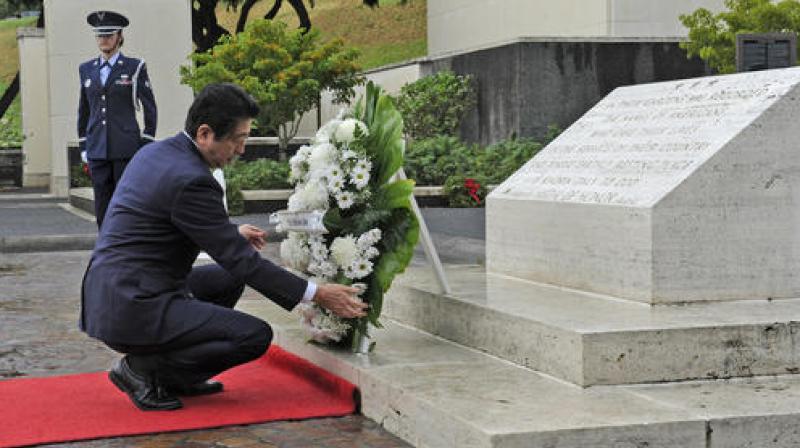Abe's Pearl Harbor pilgrimage underlines US-Japan tie

Honolulu: Japanese Prime Minister Shinzo Abe travels on Tuesday to Hawaii's Pearl Harbor, the site of a sneak attack by his country that provoked America into joining World War II, to reinforce what the leader calls "the power of reconciliation."
Abe will be hosted by US President Barack Obama, who quits office next month. That means Abe will soon lead Japan into uncharted waters, after incoming US president Donald Trump clouded the guiding stars of US-Japanese ties.
The Trans-Pacific Partnership trade deal that Obama was pushing for and that Abe made the heart of his economic strategy has been torn up by the president-elect.
And, at least on the campaign trail, Trump has even called into question the US security guarantees that shielded Japan through the Cold War and later the rise of China.
In eight years, Obama, America's Hawaiian-born first "Pacific president" never made the headway he wanted in his vaunted "rebalance to Asia" diplomatic strategy.
But he and Abe chose a telling spot to celebrate US-Japanese partnership, 75 years after the "day of infamy," December 7, 1941.
The Japanese sneak attack on an unsuspecting US fleet moored at Pearl Harbor turned the Pacific into a cauldron of conflict.
The attack had been prepared in secret by Japan for months, but was over within two hours.
Japanese warplanes came out of nowhere to sink much of the US fleet and leave 2,400 sailors and Marines dead.
A reluctant America was drawn into the war already raging in Europe and its colonies, a war that ended after US atom bombs razed the Japanese cities of Hiroshima and Nagasaki.
Post-war cooperation, however, has healed many wounds.
In May, Obama visited Hiroshima to pay his respects, and on Tuesday Abe will become the first Japanese premier to visit the wreck of the USS Arizona.
The leaders will head by boat to a white-walled memorial positioned over the sunken vessel, still lying in the clear blue waters of the harbor where 1,177 of its crew died.
Only five of the Arizona's crewmen are still alive and, while the memorial remains a tourist draw, in Hawaii the divisions of war have given way to a shared present.
"Hawaii has a very multi-ethnic population with a very large Japanese population," Stanley Chang, a 34-year-old Democratic member of the Hawaii state senate told AFP.
"I don't think there is any feeling of antipathy towards the Japanese, 75 years after the attack."
Today, Obama's home state has a reputation as one of the most multi-ethnic and multi-cultural in the union.
Remember Pearl Harbor
Today, December is peak tourist season in balmy Hawaii, and the American First Family is partway through its annual Christmas break on the islands.
But the scene was grim in 1941 when Admiral Isoroku Yamamoto maneuvered six aircraft carriers to within 240 miles (386 kilometers) of Oahu and unleashed two waves of dive bombers.
The US Pacific fleet, formerly Japan's main rival in the region, lost 21 warships and 328 planes.
Hundreds of sailors drowned when the USS Oklahoma, still lashed to the quay, pitched onto its side and trapped them.
Before the attack, the US isolationist campaign's cry of "America first!" -- now revived as Trump's slogan -- found a ready ear among voters wary of embroilment in Europe.
But after Pearl Harbor, US Congress declared war on Japan. Three days later Japan's European ally Nazi Germany declared war on the United States in turn.
The "America first!" slogan was quickly replaced on posters, in political speeches and in song by recruiters's refrain: "Remember Pearl Harbor."
Three-quarters of a century later, Abe wants to imbue the wartime rallying cry with a new resonance.
"'Remember Pearl Harbor' is a phrase that was once used to fuel animosity toward Japan among the people of America.
"The peoples of Japan and the United States were put in position to hate each other," he said.
"I hope the image of President Obama and I together visiting Pearl Harbor will serve to make the term 'Remember Pearl Harbor' symbolize the power of reconciliation."
The same force of reconciliation was on show in May, when Obama surveyed preserved ruins in Hiroshima and revived his Nobel-winning call for a world without nuclear weapons.
Trump, who takes office on January 20, was forced to backtrack during his campaign after he appeared to suggest Japan break a taboo and develop its own nuclear weapons.
Last week he again caused consternation when he blithely threatened to revive a Cold War-style arms race.

